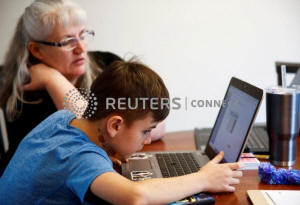Tariff pain turns to gain: U.S. computer, toy stockpiles
help meet virus rush
 Send a link to a friend
Send a link to a friend
 [April 01, 2020] By
Paresh Dave [April 01, 2020] By
Paresh Dave
OAKLAND, California (Reuters) - As the
coronavirus outbreak forced classes online, Boston Public Schools
ordered 20,000 laptops and had them in hand in four days - an unusually
fast turnaround made possible by a build-up of inventory prompted by the
U.S.-China trade war.
Computer companies including Boston school vendor Acer Inc <2353.TW>
ordered extra laptops for import in early December ahead of scheduled
U.S. tariffs on products from China, where 90% of the world's laptops
and monitors are made.
While the tariff plans have since been canceled as part of a "phase one"
trade deal, the build is letting companies meet a surge in demand from
U.S. students and workers stuck at home due to lockdowns, even as
customers in Japan, India and Britain face weeks-long delays and "out of
stock" signs.
"We're going to be able to fulfill everything for everybody" in the
United States, said Richard Black, a vice president of marketing at
Acer, which sold about as many laptops worldwide as Apple Inc <AAPL.O>
last year.

"It turned out to be an excellent call to order early."
Other products sought after by families on lockdown, including toys and
computer monitors, are also relatively plentiful in the United States.
They too had been scheduled to fall under a 15% tariff starting last
Dec. 15.
California-based MGA Entertainment, which sells Little Tikes backyard
toys and LOL Surprise collectible dolls, in December placed an import
order for 15% more than normal from China, or slightly under $10 million
in goods, CEO Isaac Larian said.
It has been able to fulfill about 60% of U.S. demand as consumers seek
ways to entertain their children at home.
Fulfillment rates are lower in Europe, where MGA did not bring in extra
products, Larian said.
"It did work out a little but the supply chain is still disrupted
majorly," he said.
The virus closed many factories in China for a month or more, delaying
spring-time deliveries to warehouses globally.
The coronavirus originated in China last year and has since spread
across 205 countries and territories. Globally it has infected more than
850,000 people and killed over 42,000, according to a Reuters tally.
[to top of second column] |

A 4th grader at Cottage Lake Elementary tries to figure out
assignment instructions on his laptop as he navigates the online
learning system the Northshore School District will use for two
weeks due to coronavirus concerns, at his home in Woodinville,
Washington, U.S. March 11, 2020. Demand for laptops and monitors
have surged in the U.S. as more people work and study from home.
REUTERS/Lindsey Wasson/

DEMAND IS BUZZING
Some popular computer monitors now are out of stock even in the United States as
a result of the work-from-home rush, said Linn Huang, an analyst at technology
market tracker IDC.
On Amazon.com, merchants have raised prices on top-rated consumer laptops by $50
to $100, according to tracking on price comparison tool CamelCamelCamel.
However, businesses purchasing from commercial sellers have not seen price
jumps, according to industry analysts.
Boston schools paid $5 million, or about the usual $250 each, for the 20,000
Chromebooks sent by Acer on two trucks each from warehouses in Los Angeles and
Chicago.
"Now is not the time when dealing with children and education environments to
try to jack up prices and have some short-term profitability," Acer's Black
said.
Analysts expect laptop demand to slow if the global economy sputters further and
widespread layoffs continue due to the impact of the virus.
But with many still tuning their work-from-home set-ups, demand is buzzing.
Computer exports from South Korea surged 82% in March over last year.
Some computer makers are even weighing the expensive move of transporting
devices by plane versus boat, said Jeff Lin, a Tapei-based researcher at Omdia.

The goal, he said, is to gain market share by being first to get devices in
stock.
(Reporting by Paresh Dave, Editing by Jonathan Weber and Himani Sarkar)
[© 2020 Thomson Reuters. All rights
reserved.] Copyright 2020 Reuters. All rights reserved. This material may not be published,
broadcast, rewritten or redistributed.
Thompson Reuters is solely responsible for this content. |